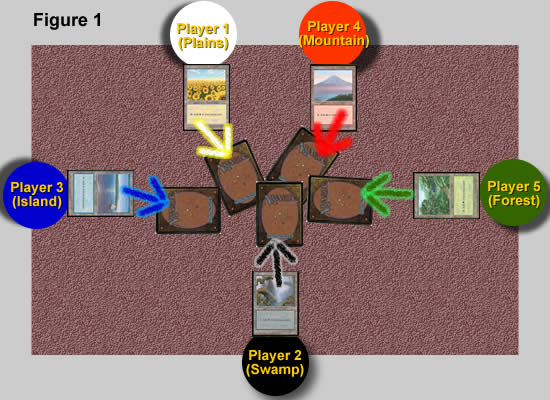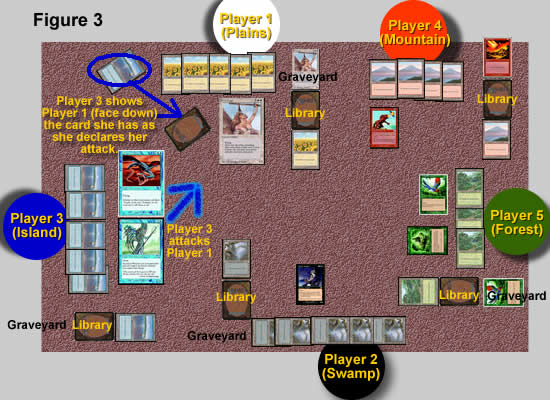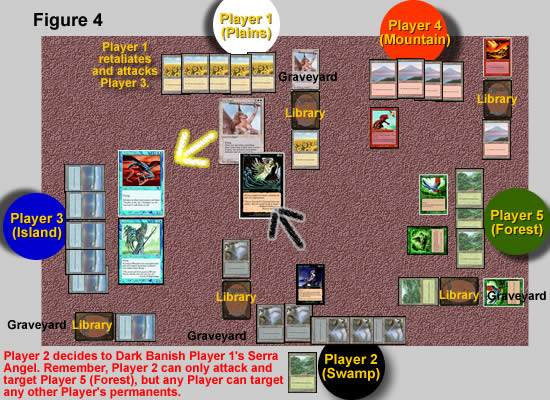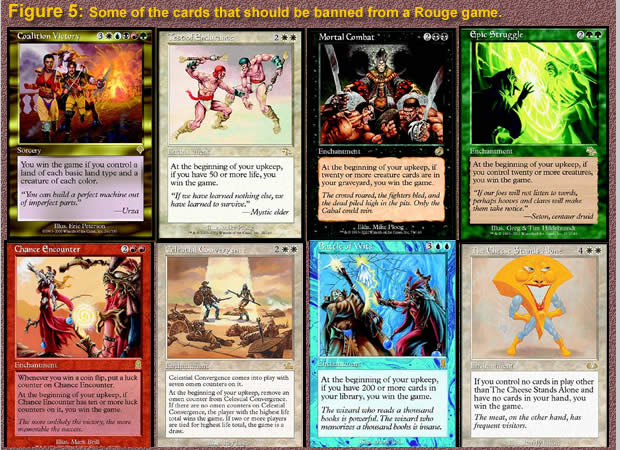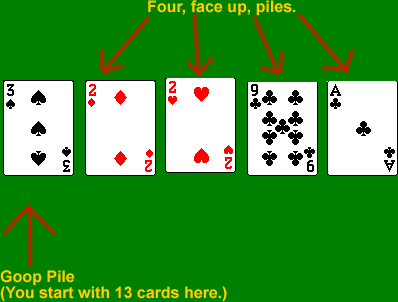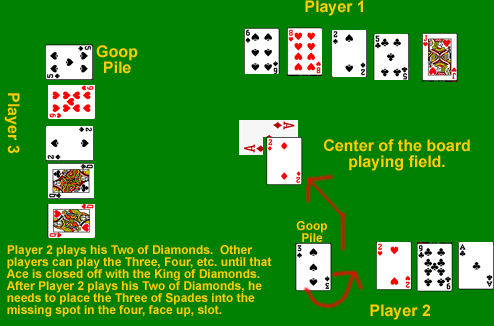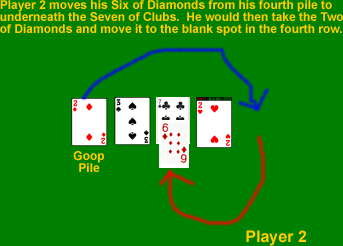Typically, Players choose to be represented by a card they enjoy playing
(I normally use a Counterspell). Note that two players cannot use the
same card. Since the card represents the individual Player in the game,
you cannot have two people having the same card. These cards are simply
markers and cannot be used in the game in any other way.
Next, choose one Player to shuffle up, face down, the cards in the
center of the table. To recap: Each Player has two identical cards.
These cards represent them in the game. She takes one of those cards and
puts it into the pile at the center of the table face down and places
the other card in front of her library face up. Got that? Once the
Player has shuffled the face down cards, she asks each Player to draw a
card and look at it. Players cannot, at this point in the game, show the
card to any other Player. The drawn card represents the person you can
attack in the game. To break this down into a real life example, let's
say that there are five players in the game. Player 1 is represented by a
Plains, Player 2 by a Swamp, Player 3 by an Island, Player 4 by a
Forest, and Player 5 by a Mountain. After each Player draws a card, the
results are (see Figure 2):
Player 1 (Plains): Swamp
Player 2 (Swamp): Forest
Player 3 (Island): Island
Player 4 (Forest): Mountain
Player 5 (Mountain): Plains
Follow me so far? Here's the breakdown of what this means: Player 1
(Plains) can only attack Player 2 (Swamp), Player 2 (Swamp) can only
attack Player 4 (Forest), Player 3 (Island) is the Rogue (who can attack
anyone) because she drew her own card, Player 4 (Forest) can attack
Player 5 (Mountain), and last, but surely not least, Player 5 (Mountain)
can attack Player 1 (Plains). Again, at this point in the game, Players
cannot reveal their cards to each other. They take their cards and hide
them, face down, out of sight.
Playing the Game
After rolling dice to see who goes first, each Player draws seven cards,
and then draws an eighth on the first turn. Play from here on in mostly
resembles a normal Magic game. Unlike some Magic variants, Players
can't share mana or block creatures attacking another Player. The tricky
part of the Rogue game is to stay alive. A typical game of Rogue
develops into several rounds of buildup as Players prepare their forces
to attack. In all the games of Rogue that I have played, I have never
seen a creatureless deck. Since you will most likely need to take out
several people in the game, having creatures to do damage (or to block
incoming attacks) is almost a must.
Let's jump the timeline and see further into the game. After five rounds
of buildup, most Players have built up a sizeable force. Several
creatures are out on the table and everyone is trying to figure out who
is the Rogue. There could be more than one Rogue in the game. The best
games I have played consist of only one or two Rogues. Why is it good to
be the Rogue? Again, this person has the ability to attack anyone on
the table. In the example we used above, Player 3 is the Rogue. On her
turn, she decides to attack Player 1 (Plains). She declares her attack,
waits for Players to respond to her declaring an attack, and then
slides, face down, the card she picked before the game started over to
Player 1 (see Figure 3).
Only Player 1 should see this card. Upon looking at it, he sees that she
drew the Island and is a Rogue. Again, all Players leave their
"representative" card face up in front of their library. The card drawn
to see who you can attack is hidden face down out of the way. (In a good
game of Rogue, Player 1 would keep quiet and not tell anyone that
Player 3 is the Rogue, but, alas, sometimes Players can't keep a
secret.)
Player 3 (Island) attacks with two of her creatures and Player 1
(Plains) chooses to take damage. On Player 1's next turn (see Figure 4), he is given one round of retaliation
against Player 3.
Thus, on his turn, Player 1 opts to attack with a Serra Angel and do 4
points of damage to Player 3. Because Player 1's attack is in
retaliation, he does not need to show his card to Player 3, but if he
chose to attack Player 2 (Swamp) instead, then he would need to show his
face down card to Player 2. When Player 3 takes her next turn, she
realizes that if she keeps attacking Player 1 that she's not going to
win the game. Since she's a Rogue and knows that only another Rogue can
attack her, it is in her best interest to sit back and wreck havoc with
other Players.
What You Can and Cannot Do
The game of Rogue is structured so that you are forced to attack only
the person whose card you have (unless you're the Rogue). If you have an
Incinerate or other single target player spell, you cannot cast that
spell on any Player other than the person whose card you have. Thus,
Player 1 (Plains) can only target Player 2 (Swamp) unless he gets a one
round of retaliation from being attacked by the person who has his card
(or the Rogue). Blanket spells such as Hurricane or Earthquake affect
all Players. Players might agree ahead of time to restrict the number of
such cards in their decks to make the game more exciting. Your group
will need to decide on this. I would also suggest that all cards that
offer an alternate form of winning be banned from the game (see Figure
5).
To complicate matters (and thus make the game more exciting), anyone can
target the permanents of all Players. Let's break that down: Each
Player can destroy, steal, burn, (or even counter) any permanent in play
(or coming into play). You just can't target a Player whose card you do
not have (again, unless you're the Rogue). In the example we've used so
far, Player 5 (Mountain) can pick a person to annoy and burn every
creature he casts. Maybe he doesn't like the color of the shirt that
Player 1 is wearing so he picks on him. It doesn't matter. He can burn
Player 1's permanents until his heart's content. But to clarify the
rules, Player 5 (Mountain) cannot target Player 2 directly with a spell
unless it's a retaliation attack (or he later obtains the Swamp card).
What does this do for the game? It creates chaos! Typically, one Player
will start to bluff and try to restrict another opponent's progress in
the game. I've attacked my opponent (whose card I had) only to have
another Player cast a Fog and stop my attack. When such moves are made, a
Player need wonder: Does that person have my card? Is he out to get me?
Or is he the Rogue and can attack anyone?
Life Gain and Scooping Up the Cards
If you defeat (lower to 0 life or run out of cards) the opponent whose
card you have, you gain 5 life and get to take his hidden, face down
card. (If you're a Rogue, you can kill anyone you want and still gain
the card and the 5 life.) After you kill your opponent and obtain her
card, you're then able to attack that new person (or if you're lucky,
you will have killed the person who had your card and you become a
Rogue).
After the game has progressed, there will be times in which a stalemate
occurs. Players might have killed each other to a point in which no one
else can attack. Depending on how cutthroat your group is, you can end
the game and state that everyone left alive is a winner (Nah!), or play
more aggressive, and open the game to being a free-for-all. In my group,
we never ended the game until there was only one person left.
Strategy, Schmategy
As in any multi-player game, the Rogue variant demands that a Player
watch her resources and reserve energy for the long haul. Yes, you can
come out with guns blazing and kill your opponent, but you attract the
Rogue's wrath or leave yourself open to the Player who has your card.
For the purpose of everyone's enjoyment, I'd also suggest that your
group ban the showing of cards among Players. Players can only show
whose card they have when they attack and can never show their cards in
hand to another Player. If a Player has a Giant Growth and wants to use
it on your creature to save it from dying, then she needs to say that
openly. The strategy involved in playing the game can bring great fun
back to your Magic games. Not only do you need to find out who is out to
get you, but you need to play and make your own decisions in regard to
who you will and will not help throughout the course of the game.
Holding an Incinerate in your hand isn't going to let you win, if you
could have used that card to kill the Rogue's remaining defending
creature so that another Player could have killed the Rogue in a
retaliation attack.
On the flip side of the coin, if you're the Rogue, don't announce this
fact. If you begin to attack everyone on the table, you've made a room
full of enemies. Bide your time, build up your resources and pick one
target to attack. Picking on the weakest Player might serve you best.
Remember, you'll gain another 5 life if you knock that Player out of the
game. Be ruthless, but remember not to overextend your resources.
Dropping all your creatures onto the board to kill a Player and then
having the next Player cast a Wrath of god will wreck you.
The Deck's the Thing
In being successful at this game, you need to be resourceful and build a
deck that's able to withstand the long haul. Playing a Sligh deck of 60
cards might help you kill one opponent, but what will you do when the
Player who's out to get you plays a Wrath of god and then drops out a
Protection from Red creature? It's important to build a balanced deck.
More importantly, your group needs to decide upon a play style. My
friends and I started playing back in the days of Unlimited. We've
decided to play Type 1 with a minimum of 90 card decks. Why? If you've
never tried such a large deck, give it a shot. It might seem foreign
playing with so many cards at once, but there's some great fun to be
had. Whatever your group decides, make certain that everyone sticks to
the rules. If you would rather play T2, Sealed, or Extended, then go for
it.
Here's a listing of the deck I typically use.
Blue:
Clone x 4
Time Walk
Timetwister
Hurkyl's Recall
Mana Drain
Force of Will x 4
Dissipate x 4
Counterspell x 4
Zephid x 3
Treachery x 3
Green:
Hurricane x 2
Regrowth
Multani, Maro-Sorcerer x 2
Gold:
Iridescent Angel
White:
Balance
Land Tax
Spirit Link x 2
Serra Angel x 4
Archangel
White Knight x 2
Disenchant x 2
Sword to Plowshares x 4
Artifacts:
Zuran Orb
Tawnos's Coffin
Icy Manipulator x 3
Mercadian Atlas x 2
Planar Portal
Sol Ring
Land:
Forest x 5
Plains x 7
Island x 13
Savannah x 4
Tropical Island x 4
Tundra x 4
Karakas
Maze of Ith
Strip Mine
Next,
choose one Player to shuffle up, face down, the cards in the center of
the table. To recap: Each Player has two identical cards. These cards
represent them in the game. She takes one of those cards and puts it
into the pile at the center of the table face down and places the other
card in front of her library face up. Got that? Once the Player has
shuffled the face down cards, she asks each Player to draw a card and
look at it. Players cannot, at this point in the game, show the card to
any other Player. The drawn card represents the person you can attack in
the game. To break this down into a real life example, let's say that
there are five players in the game. Player 1 is represented by a Plains,
Player 2 by a Swamp, Player 3 by an Island, Player 4 by a Forest, and
Player 5 by a Mountain. After each Player draws a card, the results are
(see Figure 2: click on the image for the full size):
It's not the best, it's not perfect, but it's loads of fun to play. This
deck of mine was originally built almost nine years ago and has evolved
to the point it is at now. Take a look at the style behind it and pay
particular attention to my choice of cards. Certain cards such as
Counterspell, Swords to Plowshares, and Balance are a must. My finisher
card is a Hurricane. Many times I've been able to pull off a Hurricane
to win the game. If you don't own these types of cards in your
collection, play Rogue with whatever cards you and your friends have.
Once you give it a try, I think you'll enjoy it. Have fun!



